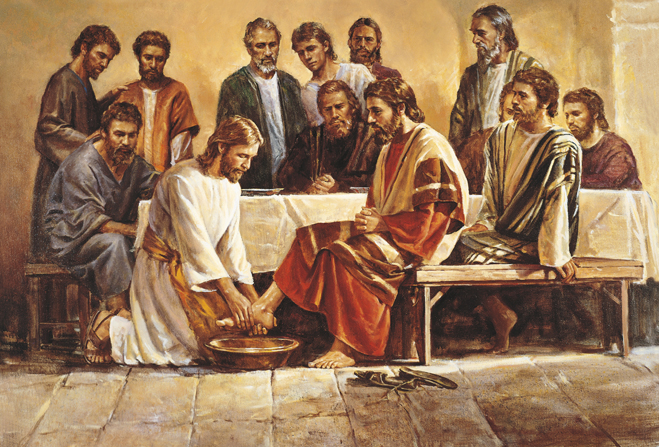“Love
is one of the chief characteristics of Deity, and ought to be manifested by
those who aspire to be the sons of God. A man filled with the love of God, is
not content with blessing his family alone, but ranges through the whole world,
anxious to bless the whole human race" (Joseph Smith, History of the
Church, 4:227).
Why the Savior Wants
Us to Serve Others
Q Why does the Lord
want us to serve others? What blessings come to us as we serve?
1. "Through the
service of men and women and boys and girls, God’s work is done. President
Spencer W. Kimball explained: “God does notice us, and he watches over us. But
it is usually through another person that he meets our needs” (Teachings of
Presidents of the Church: Spencer W. Kimball [2006], 82)" (Gospel Principles,
Service).
2. "When ye are in
the service of your fellow beings ye are only in the service of your God"
(Mosiah 2:17).
When
we are baptized we covenant to be willing to take upon ourselves the name of
Jesus Christ. Commenting on this, the prophet King Benjamin taught:
3. "I say unto you,
I would that ye should remember to retain the name written always in your
hearts, that ye are not found on the left hand of God, but that ye hear and
know the voice by which ye shall be called, and also, the name by which he
shall call you. For how knoweth a man the master whom he has not served, and
who is a stranger unto him, and is far from the thoughts and intents of his
heart?" (Mosiah 5:12-13).
By
keeping our baptismal covenant to serve others, we receive the Holy Ghost in
our lives access more of the blessings of the atonement of Jesus Christ. We can
have assurance that we are on the path back to God. We become more loving and
less selfish, which decreases our desire to sin. In times of adversity, keeping
this covenant to serve others can lift our burdens.
4. "When the Son of
man shall come in his glory, and all the holy angels with him, then shall he
sit upon the throne of his glory: And before him shall be gathered all nations:
and he shall separate them one from another, as a shepherd divideth his sheep
from the goats: And he shall set the sheep on his right hand, but the goats on
the left. Then shall the King say unto them on his right hand, Come, ye blessed
of my Father, inherit the kingdom prepared for you from the foundation of the
world:
"For
I was an hungred, and ye gave me meat: I was thirsty, and ye gave me drink: I
was a stranger, and ye took me in: Naked, and ye clothed me: I was sick, and ye
visited me: I was in prison, and ye came unto me. Then shall the righteous
answer him, saying, Lord, when saw we thee an hungred, and fed thee? or thirsty, and gave thee drink? When saw we
thee a stranger, and took thee in? or
naked, and clothed thee? Or when saw we thee sick, or in prison, and came unto
thee? And the King shall answer and say unto them, Verily I say unto you,
Inasmuch as ye have done it unto one of the least of these my brethren, ye have
done it unto me" (Matthew 25: 31-40).
Q What can we learn
about the importance of service from that parable?
5. "Service is not
something we endure on this earth so we can earn the right to live in the
celestial kingdom. Service is the very fiber of which an exalted life in the
celestial kingdom is made" (Marion G. Romney, October 1982 General
Conference).
How We Can Serve
Families
6. "But Jesus
called them unto him, and said, Ye know that the princes of the Gentiles
exercise dominion over them, and they that are great exercise authority upon
them. But it shall not be so among you: but whosoever will be great among you,
let him be your minister; And whosoever
will be chief among you, let him be your servant: Even as the Son of man came not to be
ministered unto, but to minister, and to give his life a ransom for many"
(Matthew 20:25-28).
Q How following the
example of Christ's service strengthen our families?
7. "Strengthen your
brethren in all your conversation, in all your prayers, in all your exhortations,
and in all your doings. And behold, and lo, I am with you to bless you and
deliver you forever" (D&C 108:7-8)
Q How can we do these
things in our families?
Q What other ways can
we serve members of our family?
Church
Callings
8. "Soon after
baptism new members receive from priesthood leaders the blessing of a responsibility
to help in the Church. This is referred to as a calling. All of the work in the
Church is voluntary. No one is paid for such service. When we accept callings,
we are sustained publicly in a Church meeting so that other members can
acknowledge our calling and provide support. We are also set apart by a
priesthood leader and given special blessings to help us fulfill our callings.
The Church needs the talents and abilities of every member to fill a wide
variety of callings. All callings are important and help build God’s kingdom.
We are to accept such callings and work diligently to learn and fulfill our
duties. As we do so, we grow in faith, develop new talents and a greater
ability to serve, and receive numerous other blessings" (Preach My
Gospel).
Q What are some key
lessons you have learned about the importance of performing our callings?
·
Callings
give us an opportunity to build the kingdom of God and to make a difference in
the lives of others.
·
No
calling is more important than another; we just move around and become more
polished with each calling.
·
All
positions are volunteer. No one is a professional; we are all ordinary,
everyday members trying to keep our covenants to serve others and build up
God's kingdom. The Ward is as strong as you make it. The more you invest in
strengthening the Ward the more it will lift and strengthen you.
·
We
support each other in our callings. We each have a leader that helps us be
successful in our callings.
·
We
seek to be merciful to others when they don't perform they callings as well as
we think they should.
·
The
key to being successful in each calling is seeking to serve others in a
christlike, loving way.
·
The
Holy Ghost will let us know when we need to do more or when we've done too
much.
"God does not begin by asking us about our ability, but only about our availability, and if we then prove our dependability, he will increase our capability!" (Neal A. Maxwell, July 1975 Ensign).
"Each of us should apply [the principle of selfless service] to our attitudes in attending church. Some say “I didn’t learn anything today” or “No one was friendly to me” or “I was offended” or “The Church is not filling my needs.” All those answers are self-centered, and all retard spiritual growth.
"In contrast, a wise friend wrote:
“Years ago, I changed my attitude about going to church. No longer do I go to church for my sake, but to think of others. I make a point of saying hello to people who sit alone, to welcome visitors, … to volunteer for an assignment. …
“In short, I go to church each week with the intent of being active, not passive, and making a positive difference in people’s lives. Consequently, my attendance at Church meetings is so much more enjoyable and fulfilling.”
"All of this illustrates the eternal principle that we are happier and more fulfilled when we act and serve for what we give, not for what we get" (Dallin H. Oaks, April 2009 General Conference).
Q What questions do you
have about church callings?
Q How have callings
been a blessing to you?
For more about serving in the church, see http://ldsgospellessons.blogspot.com/2014/03/serving-in-the-church.html
Other
Q What are other ways
we can serve and lift others? Give of ourselves?
Questions to Ponder
Q If you do not have a
church calling, what can you do to make yourself available to receive one and
the associated blessings? Are you willing to contact a member of the Bishopric
and request a calling?
Q If you have a church
calling, what can you do to fulfill this calling in a more Christlike way? Who
has already been blessed by your service? Who else could you bless in your
service? How can you make yourself more available to serve?
Q Who is someone you
can serve and show love to?
Key talks about service
Key talks about charity
Key talks about becoming more Christlike




